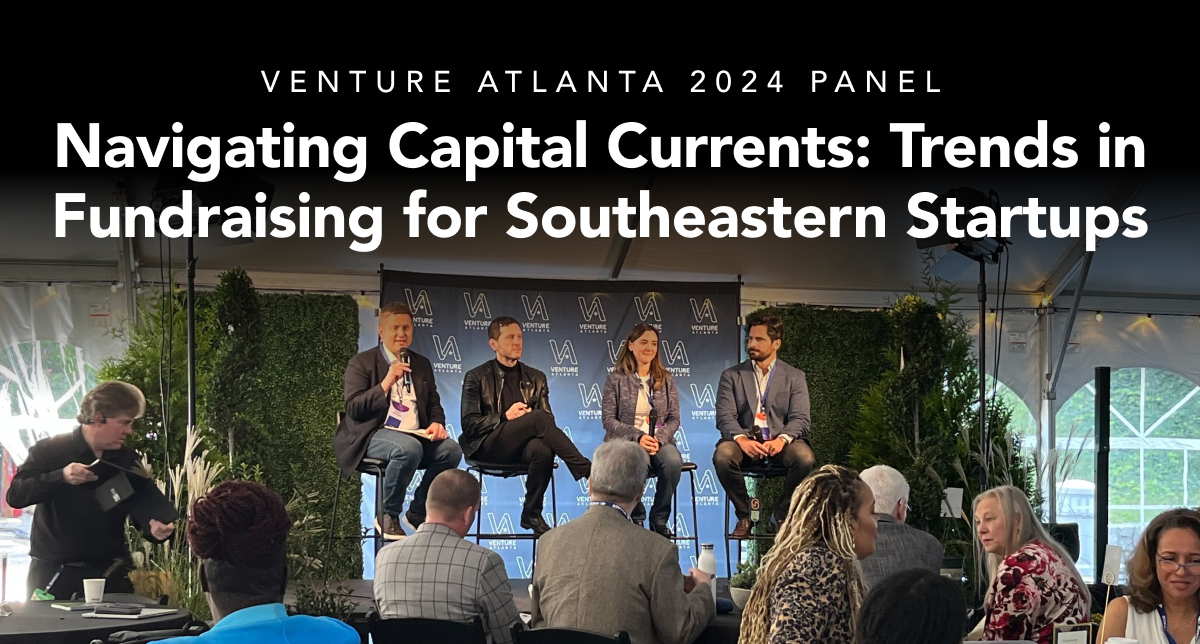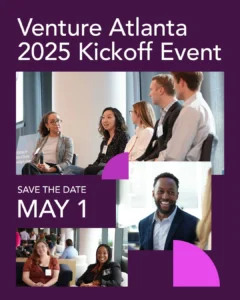On the opening day of Venture Atlanta 2024, attendees packed the outside tent for the J.P. Morgan-sponsored thought leadership panel, “Navigating Capital Currents: Trends in Fundraising for Southeastern Startups.” Featuring insights from industry leaders Howard Lerman (Roam), Vanessa Larco (NEA), and Joe De Pinho (Riverwood Capital), the session provided valuable insights into fundraising trends shaping today’s capital environment. Moderated by Derick Duchodni of J.P. Morgan, the discussion covered critical strategies for raising capital for startups in the Southeast.
Here’s what we learned about venture capital trends and effective strategies for growth.
Key Takeaways
Before we dive deeper into the panel discussion, here are a few actionable insights and takeaways that the panel had for founders:
- Stay Lean: Raise only what you need, and focus on creating value for customers.
- Build Obsessed: Delegate administrative tasks, but never lose sight of product-market fit.
- Strategize Your Board: Keep it small, focused, and composed of experienced advisors.
- Prioritize Happy Customers: They will drive organic growth and reduce marketing spend.
Key Trends in Fundraising for Southeastern Startups
The State of the Market
Joe De Pinho highlighted a rebound in deal activity in 2024 after recent fundraising challenges. However, he noted that higher interest rates and tightened corporate budgets have impacted net retention rates and sales team productivity. Vanessa Larco emphasized Atlanta’s growing prominence in growth-stage fundraising, noting her optimism for the region’s entrepreneurial energy.
The panel agreed that while challenges persist, strategic fundraising and efficient operations are essential for navigating this capital climate.
Advice for Founders
Howard Lerman encouraged founders to stay bootstrapped for as long as possible, raising minimal capital only when necessary. “You want to work with people who believe in you,” he advised, underscoring the importance of thoughtful partnerships. Vanessa added that founders must resist the allure of inflated valuations, as “higher isn’t always better” during or after a raise.
For early-stage startups, balancing operational intensity with strategic focus emerged as a critical theme. As Joe put it, “Obsession and efficiency in bookings are key to scaling successfully.”
Deploying Capital Wisely
One recurring theme was the importance of prioritizing customer satisfaction over flashy expenditures. Howard stressed that happy customers become a company’s best advocates, lowering acquisition costs and creating organic growth opportunities. Vanessa echoed this sentiment, recounting a founder who raised a fast Series A based solely on glowing customer testimonials. “Your customers should be your best salespeople,” she advised.
Joe urged founders to allocate capital toward go-to-market strategies and product development rather than chasing trends. “Don’t be Google,” he quipped, referencing the dangers of excessive R&D spending without clear returns.
Secondary Trades and Founder Focus
When asked about secondary trades, the panelists shared differing views. Vanessa expressed caution, noting that early-stage founders should prioritize reinvesting in their companies rather than personal financial gains. Howard agreed, emphasizing that obsession with building the business should come first.
Conversely, Joe highlighted the potential benefits of financial stability from secondary liquidity, which can encourage founders to take bold, calculated risks.
Scaling and Exit Strategies
The panelists stressed the importance of thoughtful board composition for growth-stage fundraising. Vanessa advocated for lean boards of 3-5 members to maintain focus and agility. Furthermore, Joe described the dangers of “party boards” that cheer without offering meaningful guidance.
For founders eyeing exits, Howard shared a passion-driven philosophy: “I don’t think about exits. Starting a company is my art, and solving problems is the reward.” Vanessa countered with a VC perspective, emphasizing that founders should deliver returns for investors by maintaining valuation discipline and exploring multiple exit paths, including private equity.
Venturing Ahead
As the Southeast continues to evolve into a leading startup ecosystem, the insights from this panel offer invaluable guidance for founders navigating today’s capital currents and fundraising trends.
For more information on J.P. Morgan’s robust venture capital network and resources for raising capital for startups, check out their website here.
And for a deeper dive into all that happened at Venture Atlanta 2024, read through our Venture Atlanta 2024 Conference Highlights blog!
Frequently Asked Questions
What are the key trends in startup fundraising for Southeastern startups?
Southeastern startups are experiencing a rebound in deal activity, with a focus on lean operations and customer satisfaction.
How should startups approach early-stage fundraising in 2025?
Founders should focus on thoughtful, strategic fundraising, maintaining realistic valuations and prioritizing partnerships with aligned investors.
What is the difference between early-stage and growth-stage fundraising strategies?
Early-stage strategies prioritize lean operations and focused spending, while growth-stage strategies focus on scaling efficiently and retaining high-value customers.
How can founders navigate the current capital environment?
By focusing on happy customers, strategic capital allocation, and efficient board composition, founders can build resilient businesses.
What role do board size and composition play in startup success?
Smaller boards of 3-5 members promote accountability and decision-making efficiency, especially during early and growth stages.


